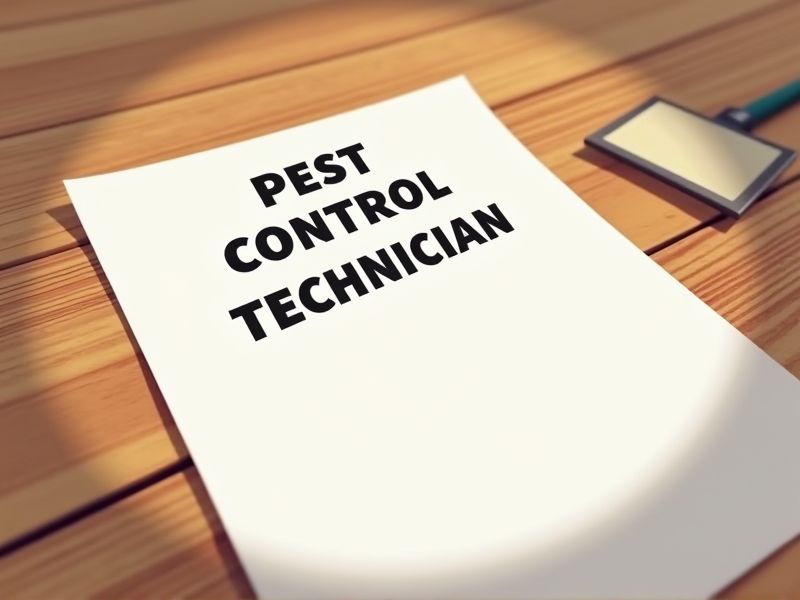
Pest control technicians face various challenges in managing and eliminating pests, requiring specialized skills and knowledge to ensure safety and effectiveness. Certifications provide a standardized way to ensure that these technicians are equipped with the necessary expertise to handle chemicals, identify pest species, and implement efficient control methods. Without proper certifications, technicians may inadvertently harm the environment or fail to comply with regulatory standards. Important certifications exist to enhance a technician's skill set and ensure best practices in pest management.
State Pesticide Applicator License
Obtaining a State Pesticide Applicator License ensures that pest control technicians are knowledgeable about safe and effective pesticide use. This licensing helps protect public health and the environment by ensuring only qualified professionals apply potentially hazardous chemicals. Having a license is also important for legal compliance, as state regulations require it for commercial pesticide application. The process of obtaining the license often involves education and testing, which elevates the standard of pest control services.
EPA Pesticide Certification (Core and Category)
EPA Pesticide Certification is needed because it ensures that pest control technicians possess the necessary knowledge to manage chemicals safely, reducing potential risks to human health and the environment. It helps maintain compliance with federal regulations, which safeguard ecosystems and public welfare from harmful pesticide exposure. The certification improves the credibility and reliability of pest control services, fostering public trust and confidence. It also equips technicians with updated practices and techniques, enhancing effectiveness in pest management.
Integrated Pest Management (IPM) Certification
Integrated Pest Management (IPM) Certification is essential for pest control technicians because it demonstrates they understand sustainable and environmentally-friendly practices in reducing pest-related issues. Certified technicians are trained to assess pest threats accurately, which leads to more effective and targeted treatment, minimizing chemical usage. IPM Certification also enhances trust with clients, as it assures them of a technician's competence and commitment to safe pest management strategies. The certification can reduce long-term operational costs by focusing on prevention and monitoring strategies rather than reactive measures.
Structural Pest Control Operator Certification
Obtaining a Structural Pest Control Operator Certification ensures that a pest control technician is trained to meet state-specific regulations and standards. The certification process educates technicians on safe pesticide use, minimizing health risks to humans and the environment. It fosters confidence among customers as certified technicians are recognized for their professional expertise. Certified technicians can access more job opportunities and potentially earn higher wages due to their verified skills.
Residential Pest Control Technician Certification
Having a Residential Pest Control Technician Certification ensures compliance with state and federal regulations, critical for legal operations. It equips technicians with the necessary knowledge to safely handle pesticides and manage pest-related health risks. Certified technicians tend to increase customer trust and satisfaction, as clients prefer verified expertise. Certification often enhances career opportunities and potential earnings within the pest control industry.
Mosquito and Vector Control Certification
Mosquito and Vector Control Certification equips pest control technicians with specialized knowledge to effectively manage and reduce mosquito populations, mitigating potential health risks such as vector-borne diseases. By complying with regulations, certified technicians ensure pest control practices adhere to public health and environmental safety standards. The certification provides a competitive edge, enhancing trust among clients seeking competent and informed pest control solutions. Standardized training through certification helps maintain industry practices that align with scientific advancements in pest control.
Rodent Control Certification
Rodent Control Certification is essential because it provides technicians with specialized knowledge to effectively manage rodent infestations. With certification, technicians are better equipped to identify and implement the most appropriate and safe control measures. This certification enhances credibility and trust with clients, as it demonstrates a commitment to professional standards. The certification also ensures compliance with local and national regulations, reducing the risk of legal issues.
EPA Worker Protection Standard (WPS) Training Certification
Pest Control Technicians work with potentially hazardous chemicals, requiring EPA Worker Protection Standard (WPS) Training Certification to ensure their safety and health. This certification equips technicians with knowledge on proper pesticide handling and application, reducing the risk of accidents and exposure. Compliance with WPS training requirements helps protect both workers and the environment by promoting responsible pesticide use. Employers face legal and financial consequences if their technicians lack proper certification, highlighting the necessity of this training.
Green Pest Management Certification
Green Pest Management Certification for pest control technicians is needed to reduce environmental impact by promoting the use of eco-friendly products and methods. It also enhances technician credibility and trust among environmentally-conscious clients, potentially increasing business opportunities. The certification ensures technicians are knowledgeable about safer alternatives, reducing harm to non-target species and human health. It aligns with regulatory trends encouraging sustainable practices, positioning businesses favorably in the evolving market landscape.
Hazard Communication Certification
Hazard Communication Certification ensures that pest control technicians understand and properly handle potentially dangerous chemicals, reducing the risk of injury or toxic exposure. It increases workplace safety by providing technicians with the necessary knowledge to communicate chemical hazards and implement appropriate safety measures. Certification also aids in regulatory compliance, meeting OSHA standards and avoiding legal penalties. Educating technicians about chemical hazards helps protect public health by minimizing accidental chemical releases into the environment.
Summary
When you hire a Pest Control Technician with certifications, you can expect enhanced expertise and professionalism. These certifications often result in safer and more effective pest management solutions. They also ensure the technician stays informed about the latest industry standards and techniques. Certified technicians often contribute to better pest control outcomes and increased customer satisfaction.
